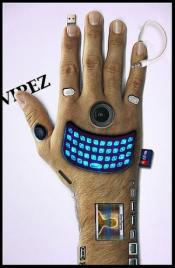Is transhumanism really the world’s most dangerous idea?
By Michael Cook,
Mercatornet
| 07. 20. 2016
In 2004 the editors of the journal Foreign Policy asked several prominent intellectuals to identify the world’s most dangerous idea. Surprisingly political scientist Francis Fukuyama’s choice was transhumanism. He described it as a movement “to liberate the human race from its biological constraints”. Its supporters, he said, want to “wrest their biological destiny from evolution's blind process of random variation and adaptation and move to the next stage as a species”.
Most people would ask, “Are you kidding?” In fact, the transhumanist projects which surface in the media do sound improbable, not to say loopy. Here are three which have been widely reported.
- Elon Musk, the American billionaire boss of Tesla and Space X, recently told a conference of programmers in San Francisco that humans need to augment their brain power with “neural lace”, a fine mesh integrated into the brain which would link the brain directly to the internet. If we fail to keep pace with artificial intelligence, we will become house pets for “ultra-intelligent AI”, he said. “I don’t love the idea of being a house cat,” he...
Related Articles
By David Jensen, California Stem Cell Report | 02.10.2026
Touchy issues involving accusations that California’s $12 billion gene and stem cell research agency is pushing aside “good science” in favor of new priorities and preferences will be aired again in late March at a public meeting in Sacramento.
The...
By Alex Polyakov, The Conversation | 02.09.2026
Prospective parents are being marketed genetic tests that claim to predict which IVF embryo will grow into the tallest, smartest or healthiest child.
But these tests cannot deliver what they promise. The benefits are likely minimal, while the risks to...
By Mike McIntire, The New York Times | 01.24.2026
Genetic researchers were seeking children for an ambitious, federally funded project to track brain development — a study that they told families could yield invaluable discoveries about DNA’s impact on behavior and disease.
They also promised that the children’s sensitive...
By Arthur Lazarus, MedPage Today | 01.23.2026
A growing body of contemporary research and reporting exposes how old ideas can find new life when repurposed within modern systems of medicine, technology, and public policy. Over the last decade, several trends have converged:
- The rise of polygenic scoring...




